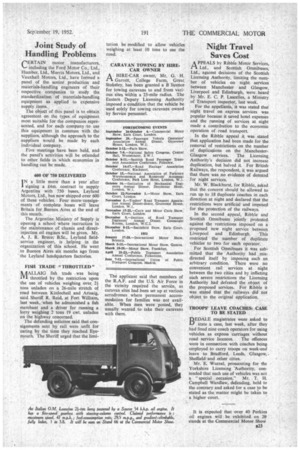Night Travel Saves Cost A PPEALS by Ribble Motor Services,
Page 57

If you've noticed an error in this article please click here to report it so we can fix it.
tt Ltd., and Scottish Omnibuses, Ltd., against decisions of the Scottish Licensing Authority, limiting the number of vehicles on night services between Manchester and Glasgow, Liverpool and Edinburgh, were _heard by Mr. E. C. P. Lascelles, a Ministry of Transport inspector, last week.
For the appellants, it was stated that night travel on express services was popular because it saved hotel expenses and the running of services at night made a contribution to the economic operation of road transport.
In the Ribble appeal it was stated that application had been made for the removal of restrictions on the number of duplications on the ManchesterGlasgow services. The Licensing Authority's decision did not increase duplication, but halved it. For British Railways, the respondent, it was argued that there was no evidence of demand for night services.
Mr. W. Blackhurst, for Ribble, asked that the concern should be allowed to run up to 18 tiuplicate coaches in each direction at night and declared that the restrictions were artificial and imposed for the protection of the railways.
In the second appeal, Ribble and Scottish Omnibuses jointly protested against the restrictions imposed on a proposed new night service between Liverpool and Edinburgh. This restricted the number of duplicate vehicles to two for each operator.
For Scottish Omnibuses it was submitted that the Authority had misdirected itself by imposing such an arbitrary condition. There were no convenient rail services at night between the two cities and by inflicting such severe restrictions the Licensing Authority had defeated the object of the proposed services. For Ribble it was stated that the railways did not object to the original application.
TROOPS' LEAVE COACHES: CASE TO BE STATED 11)11it,EDALE magistrates were asked to state a case, last week, after they had fined nine coach operators for using vehicles as express carriages without road service licences. The offences were in connection with coaches being employed to carry troops on week-end leave to Bradford, Leeds, Glasgow,. Sheffield and other cities.
Mr. E. Wurzal, prosecuting for the Yorkshire Licensing Authority, contended that such use of vehicles was not a "special occasion." Mr. T. H. Campbell Wardlaw, defending, held to the contrary and asked for a case to be stated as the matter might be taken to a higher court.
It is expected that over 40 Perkins oil engines will be exhibited on 20 stands at the Commercial Motor Show 523




































































































































































